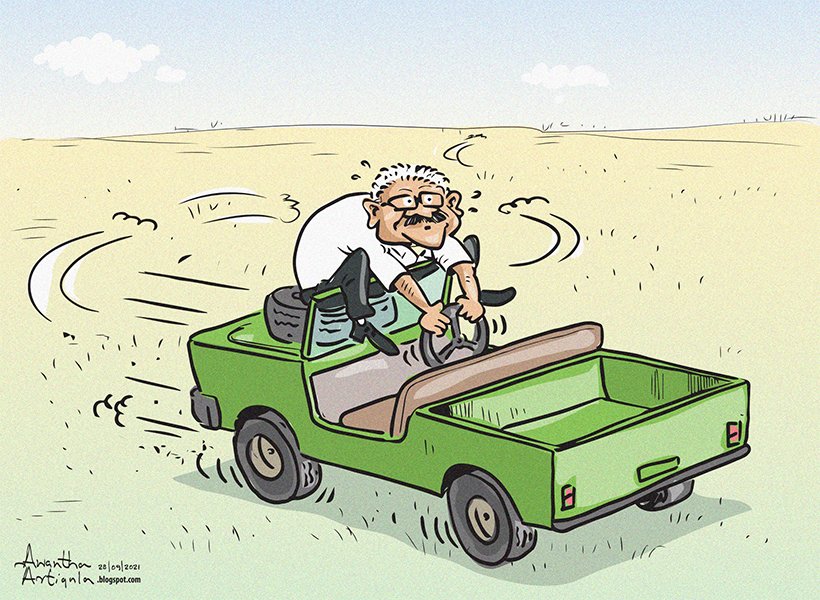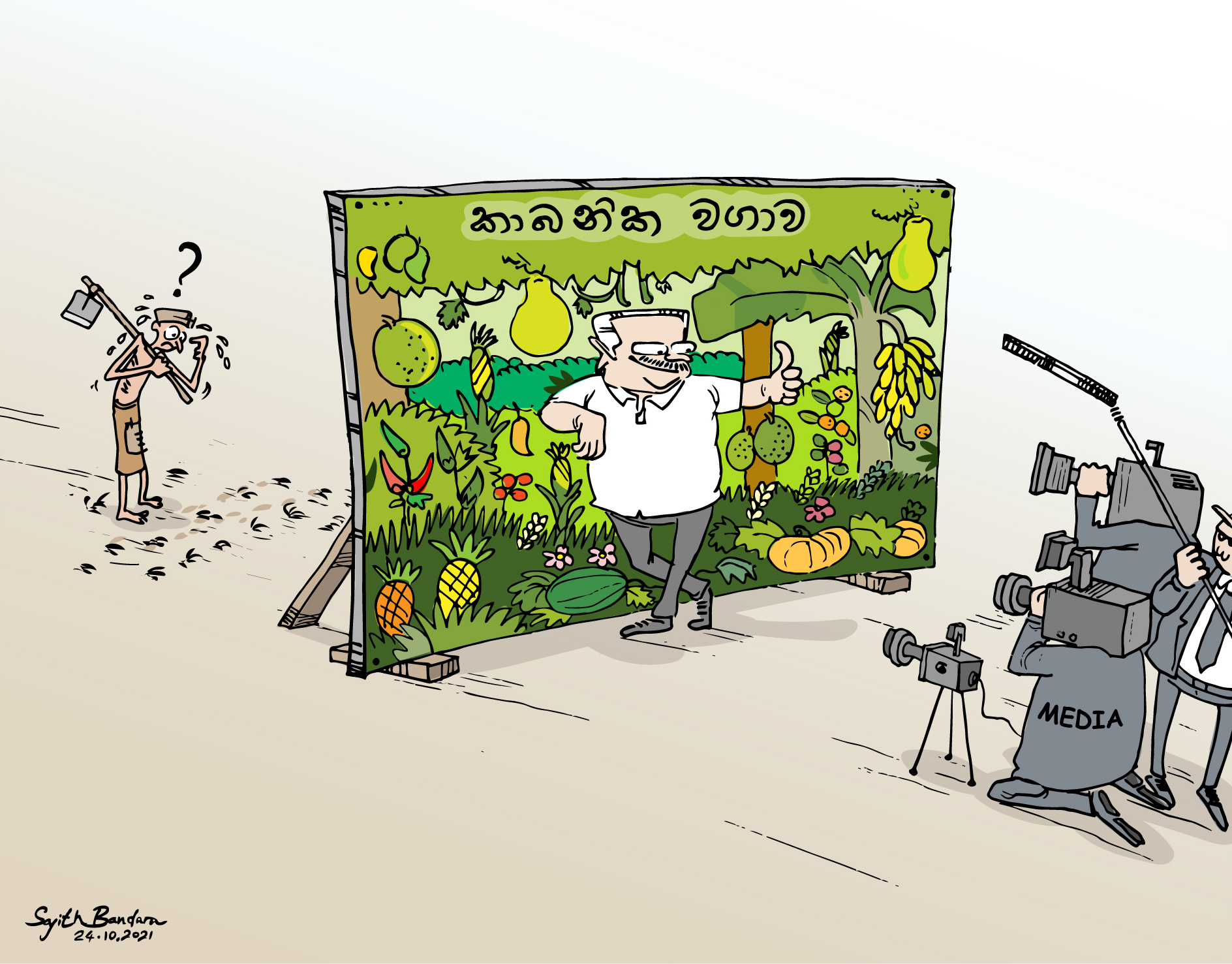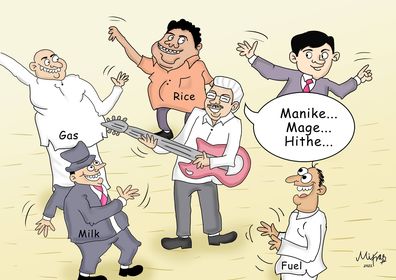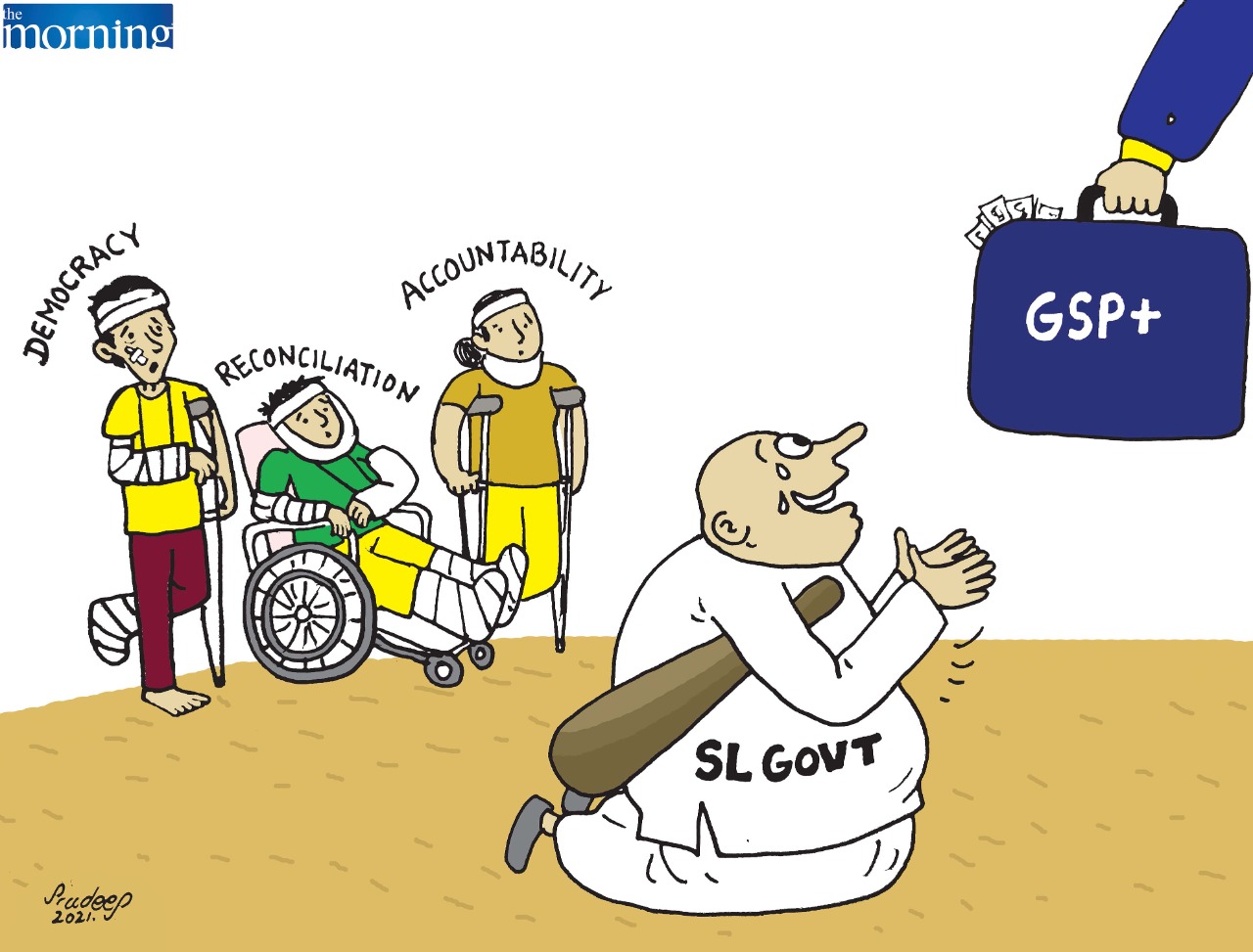We can only shake our heads at how all of us followed this lunatic…”
A German general (quoted in Volker Ullrich’s Hitler – Downfall – 1939-45)
The first seeds of America’s Afghan misadventure were sown in the closing decade of the 19th Century. The emerging global superpower’s first imperial ventures began with wars in Cuba and the Philippines. “…America is beginning a long course of error and wrong,” lamented Charles Elliot Norton, Professor of Fine Arts at Harvard, “and is likely to become more and more a power for disturbance and barbarism” (quoted in The Proud Tower by Barbra Tuchman).
When the history of China’s own descent into imperialism is written, Sri Lanka will have the dubious honour of figuring prominently in it. While the world’s eyes are on Taiwan, China is flexing its newly honed imperial muscles in the Indian Ocean. What is at stake is nothing less than Lankan sovereignty and China’s ability to impose its will on third world nations financially beholden to it.
The story began with President Gotabaya Rajapaksa’s ill conceived plan to force Lankan agriculture go fully organic between one season and the next. Importation of chemical fertilisers was banned and a consignment of organic fertiliser ordered from China. Lanka’s National Plant Quarantine Services tested two samples of the fertiliser consignment and found them to be unsterile and highly contaminated with bacteria (Bacillus and Erwinia) “which can be pathogenic to plants” (The Sunday Times – 19.9.2021). The Rajapaksa regime’s initial response was to discredit the test results. But scientists spoke out and the public protested, forcing the regime to reject the consignment.
Beijing discarded the smiling mask and Colombo was treated to a display of wolf-warrior diplomacy. The Chinese Embassy issued a not-so-veiled threat, stating that a rejection of the fertiliser could affect relations between two countries.
The matter should have ended there, especially since the supplier, Qingdao Seawin Biotech, had reportedly admitted in its shipping advice that the consignment may contain microorganisms (and is thus unsterile). But in China’s eyes, it was dealing not with a sovereign nation, but with a dependent nation. Beijing discarded the smiling mask and Colombo was treated to a display of wolf-warrior diplomacy. The Chinese Embassy issued a not-so-veiled threat, stating that a rejection of the fertiliser could affect relations between two countries. The Chinese company wrote a letter to Lankan authorities on October 22nd, stating that the consignment will reach Colombo that day, to hell with your order.
The Rajapaksas who never miss a chance to proclaim Lankan sovereignty from any available rooftop were clearly unnerved by this lupine display. They made no public response to either letter. The self-declared guardians of Lankan independence, from Buddhist monks to the likes of Wimal Weerawansa too maintained a death-like silence. But the National Plant Quarantine Centre stood firm and public pressure built up. Caught between the hammer of Chinese compulsion and the anvil of local opposition, the Rajapaksas ran for the backdoor.
The state-owned Ceylon Fertiliser Company, represented by the AG’s Department, went to Colombo Commercial Court seeking an enjoining order against the Chinese company, its local agent and the state-owned Peoples Bank which had provided the Letter of Credit. (The local agent, incidentally, is Chelina Capital Cooperation, whose managing director is a close relation of Prime Minister’s secretary, Gamini Senarath, according to a report in a Feb 15th 2015 report in The Sunday Times).
While China was brandishing its grievance, Sri Lanka ordered a consignment of nano-nitrogen fertiliser from India. The regime’s current focus is neither the suitability nor the efficacy of this fertiliser type but how to spare presidential blushes by passing it off as organic. The fact that Colombo is buying fertiliser from India must be infuriating and alarming Beijing in equal measure. Add to that recent noteworthy developments from the secret LNG deal with an American company to Namal Rajapaksa’s much hyped visit to India, and China might be wondering whether Sri Lanka is trying to put a few inches of distance between herself and her financial master.
In a recent Foreign Policy piece, Andrew Erickson (a professor of strategy in the U.S. Naval War College’s China Maritime Studies Institute), and Gabriel Collins, (of Rice University) argue that Chinese power is likely to decline after a peak period of about five years due to “deteriorating demographic profile, structural economic problems, and technological estrangement from global innovation centres.” Therefore in the next ten years Beijing will move aggressively to promote “a narrative of inevitable Chinese strategic dominance in Asia and beyond,” they conclude. Like America and its imperial predecessors, Beijing too “is likely to become more and more a power for disturbance and barbarism.” Thanks to the Rajapaksas, Sri Lanka might get a taste of that unappetising brew, soon.
That was the deal 6.9million Lankan voters made with the Rajapaksas almost two years ago – a utopia for the majority community built on the subjugation of minorities. The deal was made not in ignorance, but in knowledge.
Ursula Le Guin’s iconic short story, The Ones who Walk away from Omelas, is both a gripping tale of fantasy and a reflection on the nature and cost of utopia. Omelas is a land where everyone is happy, safe, and prosperous, a place of beauty and grace. But this ideal state comes at a cost, and that cost is borne by a single child, imprisoned in a tiny underground room and condemned to a life of neglect, malnutrition, and fear, an existence that is the exact antithesis of the paradisiacal life enjoyed by every other citizen of Omelas. Every single Omelan knows about the child. The initial reaction is horror at the price of their happiness. Eventually, most learn to live with it by forgetting. The few who can’t, walk away from Omelas, never to return.
That was the deal 6.9million Lankan voters made with the Rajapaksas almost two years ago – a utopia for the majority community built on the subjugation of minorities. The deal was made not in ignorance, but in knowledge. “Trump forged a politics of white tribalism and white people embraced it,” said US commentator Jamelle Bouie soon after 2016 presidential election. Similarly, the Rajapaksas forged a politics of Sinhala-Buddhist tribalism and the absolute majority of Sinhala-Buddhist voters embraced it.
The Rajapaksas and their patriotic army were going to build a patriotic paradise, which would allow “the trustworthy to roam everywhere under heaven while making it hard for the discredited to take a single step,” to quote President Xi Jinping on the purpose of China’s Social Credit system (Newsweek – 1.5.2018). China would fund this utopia and Sri Lanka would be China’s faithful acolyte in the Indian Ocean. As Chinese foreign minister asserted on the Jan 2020 visit to Colombo, “As Sri Lanka’s strategic partner China will continue to standby Sri Lanka’s interests. China stands for the country’s sovereignty, territorial integrity and independence. We will not allow any outside influences to interfere with matters that are essentially internal concerns of Sri Lanka.”
Two years later, the promised utopia is in shambles. The hardcore Rajapaksa base might be loyal still, but its soft outer core and the floating voters are deserting the family. As prices continue to rise and shortages continue to worsen, the haemorrhaging will intensify. To make matters worse, Beijing, beset by its own economic woes, is proving unwilling – or unable – to foot the bill of Rajapaksa extravaganza.
So the Rajapaksas cannot afford to give the West its conge but must work at engagement, even a few concessions. Dollars are scarce, and losing the GSP plus facility would be fatal at multiple levels. (If the Americans offer the Millennium grant again, the Rajapaksas would grab the 500million dollars with both hands and on bended knees). There is also the fear of Western sanctions. The US and the EU opt for targeted sanctions these days, asset freezes and travel bans on individual politicians and officials. A recent example is EU sanctions targeting Nicaraguan vice president (who also happens to be the president’s wife) and several top officials. The Rajapaksas may be willing to brave sanctions if the brunt is borne by ordinary Lankans (and thus can be weaponised politically). But sanctions that spare the economy and the people while targeting family assets abroad or the family’s chances of visiting Western lands would be quite another matter.
The AG’s Department is busy withdrawing cases against the family and their acolytes. Convicted murderer Duminda Silva is free to break more laws. The late Eliyantha White’s son and daughter are reportedly being provided with police security while Shani Abeysekara’s letter asking for protection is unanswered.
In this context, an attempt at recalibrating Lanka’s regional and international relations makes sense from a Rajapaksa point of view. After all, they have a Family Inc. to save. The past two years, however harrowing for ordinary Lankans, have been good for the Rajapaksas, a fruitful time in which their utopia has reached near completion. The 19th Amendment is gone and the 20th has placed all power in familial hands. The succession from brother to brother and from uncle to nephew is assured. The AG’s Department is busy withdrawing cases against the family and their acolytes. Convicted murderer Duminda Silva is free to break more laws. The late Eliyantha White’s son and daughter are reportedly being provided with police security while Shani Abeysekara’s letter asking for protection is unanswered.
Power is theirs, impunity is theirs. To keep those gains, they must find a way of hoodwinking the electorate again.
At a consultative committee meeting of the Ministry of Wildlife and Forest Conservation, parliamentarians Sridaran and Rasamanikkam had tried to raise some issues; prior notice had been given and the matters were on the agenda. According parliamentarian Sumanthiran, government members – with the sole exception of Chandima Weerakkody – had shouted them down, calling them kotiya (Tiger), thrasthavadiya (terrorist) and LTTE.
Sri Lanka’s state minister for women and child development celebrated the World Children’s Day in the company of Kumaran Pathmanathan alias KP, the LTTE’s international money manager and chief arms procurer, still wanted by India for the assassination of Rajiv Gandhi. Mr. Pathmanathan is now living in sunshine, because once arrested, he opted to throw his lot with the Rajapaksas. The ace Tiger struts free while ordinary Tamils are being detained for commemorating their war dead. In a related development, PM Rajapaksa is dusting off his old proposal to ban cattle slaughter.
The PC polls are on the cards, and how can the Rajapaksas mobilise their base to defend family-power, sans an enemy?
There’s some good news, coming from Turkey. Six opposition parties have agreed to form a broad front against President Erdogan and to turn the next election into ‘a kind of referendum’ on the presidential system. As an opposition leader put it, “Today, Turkey is facing a systemic problem. Not just one person can solve it” (New York Times – 23.10.2021).
Though a systemic problem cannot be solved by one person, it can be created by one person, definitely one family, especially if an electorate is myopic enough to place too much power in a single fist. As the Lankan electorate did, in 2019 and 2020.
Elias Canetti in Crowds and Power, highlights the danger inherent in what he calls ‘the anxiety of command.’ The greater the power to command, the longer the rule, the greater the anxiety and the danger; “A ruler can keep it hidden or under control…but in the course of a life, it can increase, until, as with the certain of the Roman emperors, it suddenly manifests itself in madness.”
Think of the world’s most dangerous car racing tracks, Nürburgring Nordschilfe or Le Mans. Imagine a Devel Sixteen or a SSC Tuatara, driven by a racing enthusiast who is too divorced from reality to see the twists and turns in the track or feel the speed of the vehicle.
That is Sri Lanka today.
Two years of Rajapaksa rule, Sri Lanka is akin not to the Singapore of Viyath Maga dreams but to Lebanon, a failing land.
Lebanon’s road to perdition sounds strangely familiar. It was cursed with a corrupt and sectarian leadership which acted in a bubble, refusing to see the unravelling of the economy and the suffering of the people. Beirut port explosion and the pandemic exacerbated the existing malaise. Today the country is in freefall. Unemployment, rising prices, shortages, and constant blackouts are turning ordinary lives into hell. Communal violence has broken out. Bank deposits are frozen, foreign exchange crisis has spun beyond control and the country has gone into a partial defaulting for the first time in its history.
A united front is possible only on the basis of a definitive plan (rather than a nebulous promise as in 2015) to abolish the presidency. Sans that the crash course will go on and on until the ruinous end.
The same fate Fitch Ratings has forecasted as a possibility for Sri Lanka in 2022.
Through the inferno, the family continues its merry way. President Gotabaya is turning inorganic into organic, PM Mahinda is focusing on cattle, Minister Basil is working at miracles and Minister Namal is touring India in the company of 100 Buddhist monks. They manage because the opposition is even more divorced from reality. Every ‘figure’ in the opposition is nursing presidential dreams and probably regards the competitors on the same side of the divide as greater threats than the regime. A united front is possible only on the basis of a definitive plan (rather than a nebulous promise as in 2015) to abolish the presidency. Sans that the crash course will go on and on until the ruinous end.





